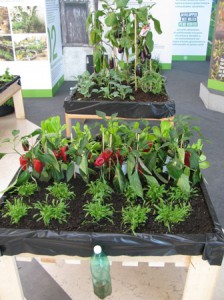- GFAR publishes list of Megaprogramme (or whatever they are called) consultations.
- Cuba’s Miscellaneous Crops Under-delegate Rolando Macias Cardenas reports on tomato paste. In other news, Cuba has a Miscellaneous Crops Under-delegate. No, wait, that’s not really news.
- While Sachs et al. moan about better agricultural data, CIAT go out and get it.
- The Pavlovsk TweetMedvedev campaign rolls on.
- “…maximum diversity can be conserved at an intermediate level of income” in Javanese bamboo-tree homegardens.
- Right, so trees “farm” bacteria. What some people will write in a press release.
- Thailand’s rice farmers trying to cope with climate change. Like they have a choice.
Nibbles: Malnutrition, Ethanol, Kenyan tea, Ethiopian coffee, Botanic garden trends, Emmer, Vietnam fish, Guerrilla gardening, Garlic speculation, Brazil and Africa, Cactus, African veggies, Ducks and rice, Salmon
- Nepal’s malnutrition rate apparently the highest in world. But the Micronutrient Initiative is on it. But what about homegardens, I hear you ask. And rice biofortification?
- The advice I’ve been waiting for all my life: better nutrition through alcohol.
- The plight of Kenyan tea workers.
- Harlem church helps Ethiopian coffee farmers.
- Botanic gardens drop flowers, do food. About time too. And botanical art too.
- Jeremy’s farro photos.
- “Iconic” catfish in trouble due to Mekong dam. Everything is an icon these days. Something to do with post-modernism, I guess.
- Seedbomb something today. You’ll feel better.
- WTF is it with garlic in China?
- EMBRAPA reaches out to Africa.
- KARI scientists push Opuntia for livestock. Ok, but surely there are enough native desert plants in Kenya to be going on with? Well, maybe not.
- Zimbabwe market turns to sun-dried vegetables. Wish I knew what umfushwa was, though.
- The Rice-Ducks Integrated Farming System sounds like great fun.
- Why the salmon thrives in Oregon: “Tribal people have practiced a natural, sustained-yield conservation since time immemorial and are taught to plan seven generations ahead.”
Rooftop sake
There was a fun story about urban beekeepers in Tokyo yesterday. Keeping bees in cities is actually not huge news, though. There’s been a lot about it in the New York press lately, for example. But the Tokyo story also had this intriguing sidebar.
The beekeepers may be an odd sight in the Japanese capital, but they are not the only urban farmers — on a rooftop just blocks away, barefoot farmers were recently wading through almost knee-high mud to plant a wet rice field.
On top of the building of the Hakutsuru Sake Brewing Co., its employees and their spouses and children were screaming with excitement as they stomped barefoot, the mud squelching between their toes.
“Good job, good job! Well done!” said Asami Oda, 56, the vice president of Hakutsuru’s Tokyo office, who takes care of the rice paddies every day.
“We harvest 60 kilograms (130 pounds) of rice every year, from which we make 80 litres of sake. Of course it’s organic. I like having a pesticides-free harvest, which is also good for the honey bees,” he said.
Which made me scurry around the internet looking for photos. And while I was doing that, as coincidence would have it, another piece on rooftop vegetation popped up, this time bamboo on top of a museum. Never rains but it pours.
Sowing new seeds in the English Midlands
The initiative, Sowing New Seeds, funded by the Big Lottery Local Food Fund, will directly enable many more gardeners in the East and West Midlands to grow non-traditional crops, while also documenting how to grow them based on the experiences of the region’s diverse communities.
Sound like a great idea from Garden Organic, and you can follow the progress of the work on a great new blog. Thanks to Nigel for the headsup.
Food for the City in Rome
There’s a great exhibit from the Food for the Cities project in FAO’s atrium this week on the occasion of the 22nd Session of the Committee on Agriculture. Here’s a quick look at a couple of the little container gardens (microgardens) they’ve created. Seem to be doing very well too.
